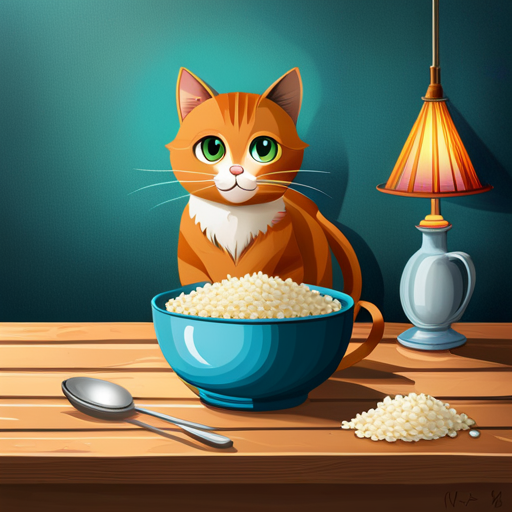Imagine the delicate aroma of basmati rice filling your kitchen, a scent that’s as comforting to you as it might be intriguing to your feline friend. You’re likely aware that cats are obligate carnivores, but you might wonder if this fragrant grain could offer them any benefits or, conversely, pose any risks.
While the nutritional value of basmati rice could provide an interesting topic of discussion, it’s crucial to weigh the potential health benefits against the possible concerns. As you ponder your cat’s dietary needs, you’re left to consider whether integrating basmati rice into their diet could be more complex than it seems.
Key Takeaways
- Basmati rice can be part of a cat’s diet but should be limited to less than 10% of daily caloric intake.
- While basmati rice offers minimal protein, it could aid in hydration and kidney function when fed in moderation.
- High carbohydrate content in basmati rice may lead to obesity and nutritional imbalances if overfed.
- Always consult a veterinarian before introducing basmati rice or making significant changes to a cat’s diet.
Understanding Cats’ Dietary Needs
Cats’ nutritional requirements are complex, demanding a diet high in protein and essential nutrients to maintain their health and vitality. Given their unique physiological makeup, it’s crucial to understand that cats are obligate carnivores. This means their bodies are finely tuned to extract nutrients primarily from animal-based protein sources, a testament to their carnivore digestion system’s efficiency. Unlike omnivores that can derive essential nutrients from a wide array of food sources, cats rely heavily on certain amino acids and vitamins that are abundant in meat but scarce in plant-based foods.
It’s important you’re aware that the protein in a cat’s diet isn’t just for energy. It’s essential for building and repairing tissues, supporting a healthy immune system, and synthesizing enzymes and hormones. High-quality protein sources, therefore, aren’t just beneficial but necessary for your feline friend’s well-being. Considering these dietary needs, it becomes clear that any deviation from a protein-rich diet could potentially disrupt their nutrient balance, leading to health issues over time. Thus, when contemplating any additions or changes to your cat’s diet, including non-traditional food items, it’s vital to proceed with caution and informed consideration.
Nutritional Value of Basmati Rice
Considering the stringent dietary requirements of cats, it’s essential to closely evaluate the nutritional profile of Basmati rice before incorporating it into their meals. Originating from the Indian subcontinent, Basmati rice is known for its distinct aroma and flavor profile, which are the result of the unique conditions of rice cultivation in this region. However, when it comes to feeding your feline friends, you must consider more than just the flavor profile.
Here’s what you need to know about the nutritional value of Basmati rice:
- Carbohydrates: Basmati rice is a high-carbohydrate food, which can be a concern for cats, as their natural diet is low in carbs.
- Protein: It contains minimal protein, which is a crucial part of a cat’s diet.
- Fiber: Basmati rice has a modest fiber content, which can aid in digestion.
- Vitamins and Minerals: It offers a limited range of essential vitamins and minerals for cats.
- Amino Acids: Basmati rice lacks certain amino acids that are vital for cats, such as taurine.
In light of this information, it’s clear that while Basmati rice might add variety to a cat’s diet, it shouldn’t be relied upon as a primary source of nutrition.
Potential Health Benefits
While Basmati rice may not be the cornerstone of feline nutrition, it does carry certain health benefits that can complement a cat’s diet under specific conditions. First and foremost, for cats who may have sensitivities or allergies to traditional grains or gluten, Basmati rice presents a viable alternative. It’s crucial to recognize that while rice allergies in cats are rare, they can occur. In such cases, Basmati rice, being naturally gluten-free, can serve as a safe source of carbohydrates.
Moreover, the importance of hydration in a cat’s diet can’t be overstated. Cats often don’t consume enough water, which can lead to various health issues, including urinary tract problems. Basmati rice, when cooked, absorbs a significant amount of water. Including a small portion of properly cooked Basmati rice in your cat’s diet can aid in increasing their overall water intake. This gentle boost in hydration can support better kidney function and contribute to a healthier urinary tract.
However, it’s essential to approach the inclusion of Basmati rice in a cat’s diet with caution, ensuring it complements a balanced, meat-based diet that meets all their nutritional needs.
Possible Risks and Concerns
Despite its potential benefits, it’s crucial to acknowledge that introducing Basmati rice into a cat’s diet also comes with certain risks and concerns. While Basmati rice can be a source of energy and may aid in digestive health for some felines, not all cats react the same way to this grain. It’s essential to approach this dietary addition with caution, taking into account the unique digestive system of cats, which may not handle grains as efficiently as humans or even some other animals do.
Here are some risks and concerns to consider:
- Allergic Reactions: Some cats may develop allergies to grains, including Basmati rice, leading to symptoms like itching and gastrointestinal discomfort.
- Digestive Issues: Cats primarily require a meat-based diet, and grains like Basmati rice can sometimes lead to digestive upset including diarrhea or constipation.
- Nutritional Imbalance: Overreliance on rice can lead to a nutritional imbalance, depriving your cat of essential animal-based nutrients.
- Obesity: High carbohydrate content in rice might contribute to weight gain and obesity in less active cats.
- Choking Hazard: Improperly cooked rice can be hard and pose a choking risk, especially for smaller or older cats.
Given these concerns, it’s advisable to consult with a veterinarian before making any significant changes to your cat’s diet.
Feeding Guidelines and Tips
Given these risks, it’s crucial to follow specific feeding guidelines and tips when introducing Basmati rice into your cat’s diet.
First and foremost, portion control is paramount. Cats require a protein-centric diet, so Basmati rice should only be offered as a small part of their overall food intake. A good rule of thumb is to ensure that the rice doesn’t exceed 10% of their daily caloric intake. This ensures that the bulk of their nutrition still comes from high-quality cat food, which is tailored to meet their specific dietary needs.
When it comes to cooking methods, always opt for plain, cooked Basmati rice. Avoid adding any salt, spices, or garlic, which can be harmful to your cat. It’s also important to thoroughly cook the rice to ensure it’s soft enough for your cat to digest easily. Undercooked rice can lead to digestive issues, including diarrhea and vomiting.
Conclusion
In conclusion, considering basmati rice for your cat’s diet is like navigating a complex maze: it requires careful thought. While it offers some nutritional benefits, it’s not a complete meal and carries potential risks if not properly balanced.
Approach feeding basmati rice with caution, adhering to guidelines to ensure your feline friend’s health and well-being. Remember, cats thrive on a diet tailored to their carnivorous needs, so always prioritize their natural dietary requirements.

